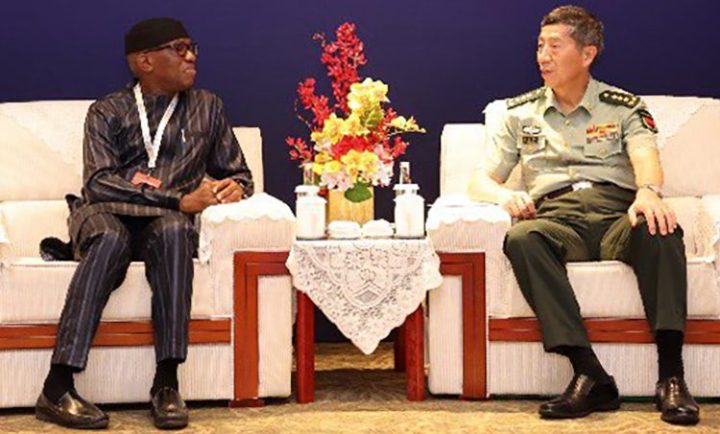ISS TODAY OP-ED
Can China be a more attractive security partner for Africa than the West?

Beijing’s Global Security Initiative may be more compelling than Western approaches, but comes with several challenges.
As China offers Africa an alternative to traditional Western partnerships, its deepening multilateral engagements could have a considerable impact on the continent, particularly on governance, human rights and regional cooperation. One aspect that has received little attention is the growing China-Africa security cooperation.
The third China-Africa Peace and Security Forum in Beijing from 19 August to 2 September convened more than 100 defence ministers and senior representatives from nearly 50 African countries and the African Union (AU). Despite the impressive turnout, it was largely overshadowed by the BRICS Summit, contested elections in Zimbabwe and coups in Niger and Gabon.
The forum focused on implementing the Global Security Initiative (GSI) proposed by Chinese President Xi Jinping in 2022. The GSI sets out Beijing’s policy principles for addressing the world’s complex and interconnected security challenges. It aims to give China a larger role in global governance by supporting countries in the south. Although China has previously provided conflict mediation, military training and aid to security forces across Africa, the GSI signals a more concerted effort from Beijing.
An alternative to the West?
As African nations seek partnerships on both sides of the prevailing global geopolitical divide, the GSI has garnered attention for its emphasis on respecting sovereignty and non-interference in internal affairs. African states have voiced frustrations with the Western-dominated structure of the international order while increasingly supporting Chinese engagement on the continent. This has extended to the peace and security sector.
Beijing’s approach diverges from Africa’s Western partners on several counts. Along with non-interference, it advocates resolving disputes through consultation and mediation over the more assertive or interventionist methods employed by some Western partners. The GSI also refrains from endorsing unilateral sanctions or collective confrontations to deal with those who breach established rules.
The ideas encapsulated in the GSI aren’t new and in some respects, mirror Western approaches (such as a shared emphasis on capacity building through training). But the GSI represents a more coordinated effort by Beijing to promote its brand of security assistance globally, with some observers speculating that Africa will be the testing ground for these aspirations.
The GSI’s promotion of non-interference will be particularly compelling to those African countries disillusioned with Western partners’ “paternalistic” approach in the field of security cooperation. French intervention in Mali and Burkina Faso is an example of this. But China’s policy could harm human rights in Africa, giving authoritarian regimes more elbow room to operate with greater impunity.
Moreover, by supplying technology to autocratic governments and training government and military officials in countries with questionable human rights records, the GSI could undermine democracy and good governance, including the AU’s Agenda 2063.
For example, the increased flow of Chinese digital tools with advanced surveillance capabilities to closed and authoritarian regimes may reinforce political repression, with Zimbabwe being a notable case. Although these concerns aren’t unique to China’s security cooperation offerings to the continent, these standards should not be accepted as the norm.
Western states emphasise the importance of democracy, good governance and human rights as integral to security cooperation, frequently attaching conditions when forming security partnerships with African countries. By doing so, they aim to foster accountable governance, promote inclusive societies and contribute to sustainable peace. Although this approach has at times been limited to lip service, it doesn’t negate the importance of individual human rights concerns in security cooperation.
Supporting ‘African solutions’
For positive results, China must translate its commitments into action and deliver security projects that empower “African solutions” while being cognisant of the continent’s governance challenges.
A more nuanced definition of “sovereignty” that accounts for states’ responsibility to protect their population’s individual human rights may be needed. This could reinforce existing continental and regional peace and security frameworks, and provide a more citizen-centric conception of security cooperation.
China and African governments should make sure that civil society stakeholders from regional peacekeeping efforts have a voice at future forums. This will bring the realities of those most affected by conflict into the discussions and improve coordination among stakeholders. GSI projects must also complement existing strategies, particularly the implementation of peace agreements and the involvement of relevant rival factions.
China’s increased security cooperation in Africa could be beneficial, but the GSI’s potential impact is not without its complexities and challenges, particularly concerning human rights and governance. It is imperative that stakeholders on the continent assess the implications and find a path that benefits African governments and their people. DM
Jana de Kluiver is a research officer at Africa in the World, Institute for Security Studies (ISS), Pretoria.
First published by ISS Today.



















Why don’t we ask the Chinese Defense Minister what he thinks?
Oh, wait, we can’t. He has not been seen or heard from since late August when he apparently displeased the party. Of course Africa would want to work closely with undemocratic, autocratic, fascist foreign powers that disappear their senior cabinet ministers.
I suspect the author of this article is too young to have been around in the ’60s and ’70s when China’s friendly interventions in Africa were seen for what they were by the newly independent rulers, resulting in the reneging of deals such as the TanZam railway and others. She also carries little knowledge of more recent cases such as the Chinese contract to upgrade Sir Seretse Khama airport in Bots (total shambles that had to be reused by SAN contractors), the shambolic reconstruction of the Great Eastern Highway in Zambia that likewise had to be reconstructed properly by SAN contractors, the Great South African Train robbery perpetrated by Chinese “helpers” and “friends” alongside their pathetically corrupt African brothers – the list goes on and on. And does she have anything to say on the expulsion of African “students” from Chinese campuses on the back of countless sexual assault charges? Nah, this “new” love affair will end just as badly I’m afraid. And I say this because I have seen that Chinese expectations of Africa diverge diametrically from African expectations of China.